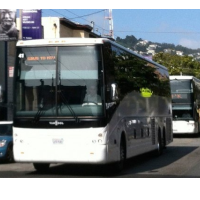San Francisco Gives “Google Buses” the Right of Way
 Mission Street in San Francisco (photo: David Gartner via Flickr)
Mission Street in San Francisco (photo: David Gartner via Flickr)
The illegal, rogue luxury shuttle buses that pissed off San Francisco residents as they carted their passengers back and forth to Silicon Valley—clogging and damaging streets, squatting at Muni bus stops, and influencing rents and rental patterns—are now legal.
The controversial 18-month pilot Commuter Shuttle Program is officially permanent. The San Francisco Municipal Transportation Agency (SFMTA) board of directors unanimously voted Tuesday to adopt a plan that limits shuttle routes and discourages giant double-deck buses from driving on small streets, parking wherever they want and using all the MTA bus stops.
The new rules also require the operators to use less-polluting buses and collect GPS data on the shuttles for analysis later. Shuttle operators, including Google, Apple, Facebook and Genetech, pay $3.67 each time they use a municipal bus stop. It has been suggested they could afford to pay more, and the money could be used for affordable housing.
The shuttles, commonly known as “Google buses,” operated without government restrictions—but with aggressive pickets and protests—until the pilot program (approved in January 2014) kicked in that August. Although street demonstrations have disappeared, the shuttles are still being contested in court.
When SFMTA approved the pilot, it said the shuttles were exempt from review under the California Environmental Quality Act (CEQA) because they wouldn’t cause serious damage or disturbance. A coalition of union members and transit and housing activists sued in San Francisco Superior Court to require an Environmental Impact Review (EIR).
They also argued that the program was illegal. They contend the program violates the California Vehicle Code by letting the shuttles use bus stops designated as red zones. The code states:
“No person shall stop, park, or leave standing any vehicle whether attended or unattended, except when necessary to avoid conflict with other traffic or in compliance with the directions of a peace officer or official traffic control device” unless it is a “bus engaged as a common carrier.”
Private buses are not common carriers.
Although the lawsuit does not hinge on housing issues, its supporters see the shuttle effects on evictions, gentrification and housing prices, especially near the ubiquitous bus stops, as valid concerns when shaping public policy. Susan Vaughan, a member of the Coalition for Fair, Legal, and Environmental Transit, told Wired, “Even though these buses say they reduce vehicle miles traveled and get cars off the road. . . . Well, not if lower-income people are being forced out of the city and forced into communities where they don’t have good public transportation infrastructure and have to drive longer distances.”
The lawsuit had its first hearing last week, and a decision could be forthcoming by December.
–Ken Broder
To Learn More:
“Google Bus” Program Approved, Now Permanent Part of San Francisco Streets (by Joe Fitzgerald Rodriguez, San Francisco Examiner)
Corporate Buses, Symbol of Changing San Francisco, Gain Approval (by Michael Cabanatuan, San Francisco Chronicle)
San Francisco’s Vote on Google Buses Today Won’t End the Controversy (by Davey Alba, Wired)
Are Tech Shuttle Buses in Bay Area a Threat to the Environment? (by Ken Broder, AllGov California)
Commuter Shuttles Policy and Pilot Program (San Francisco Municipal Transportation Agency)
- Top Stories
- Controversies
- Where is the Money Going?
- California and the Nation
- Appointments and Resignations
- Unusual News
- Latest News
- California Forbids U.S. Immigration Agents from Pretending to be Police
- California Lawmakers Urged to Strip “Self-Dealing” Tax Board of Its Duties
- Big Oil’s Grip on California
- Santa Cruz Police See Homeland Security Betrayal in Use of Gang Roundup as Cover for Immigration Raid
- Oil Companies Face Deadline to Stop Polluting California Groundwater





